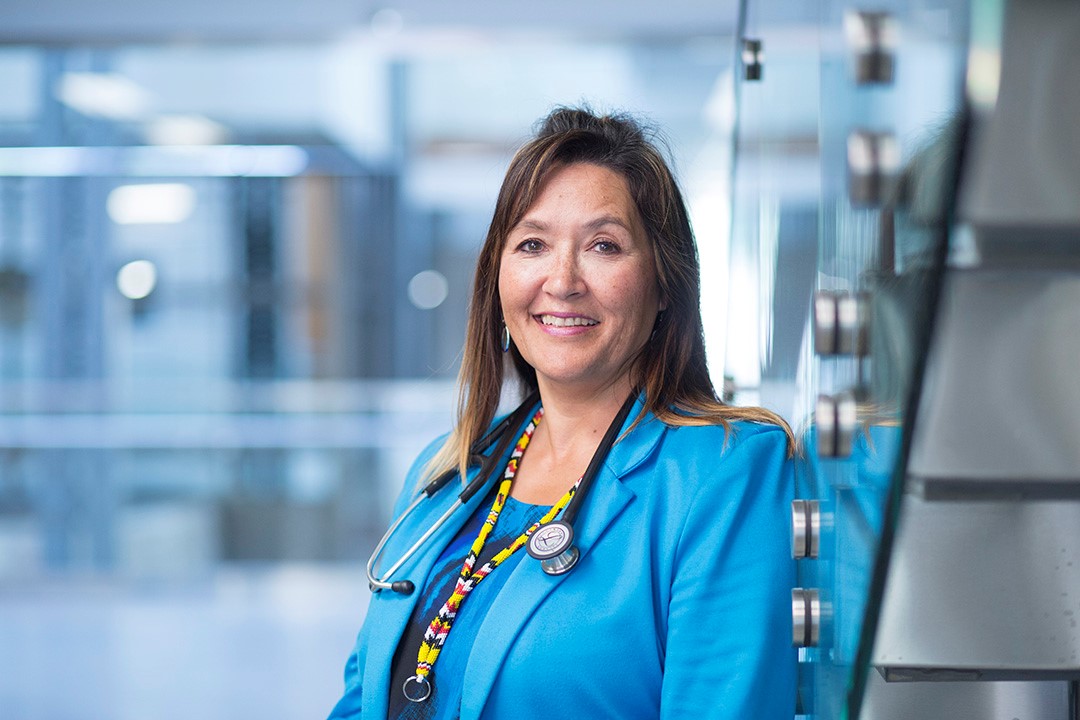
'I'm Going To Do This': with Dr. Veronica McKinney
When Veronica McKinney was a little girl, she vividly remembers going to the Saskatoon Public Library, borrowing a Time-Life book about the human body.
By Researchers Under the ScopeListen to all episodes of Researchers Under the Scope podcast.
Subscribe to the podcast on Spotify or Apple Podcasts
"I loved that book and I would read it. I would copy the cover. I can picture it even to this day, all the different little cells," said McKinney, now an assistant professor at the College of Medicine.
"I was just fascinated by how our body works and how it's just so amazing,” she said, as she recalled borrowing the book over and over, tracing the pictures on its cover.
McKinney also considers herself lucky to have a mother who taught her traditional ways of maintaining health.
While McKinney’s great-grandmother was Cree, the matriarch lost her status when she married a Métis man from northern Alberta. The family built a house on a road allowance near Midnight Lake in Saskatchewan's boreal forest, where McKinney's mother spent her childhood with her kokum learning healing techniques, how to gather medicine from the bush and how to deliver babies.
She passed that knowledge to her daughter Veronica during summers in the north, as they'd visit extended family to fish, and gather berries.
"I still to this day use some of it," said McKinney. "A lot of this is more about how you live your life every day, how we connect to the land."
By the time she was a teenager, McKinney soon saw disparities in the way people treated her Indigenous cousins, mother and family.
"I often thought, like, why are people acting so angry? I couldn't understand that," she said."It was hard to get jobs, even as a teenager, because people wouldn't look at you."
McKinney persevered, enrolling first in Arts and Science courses at the University of Saskatchewan, then transferring to train as a laboratory technologist, a career that took her west.
She remembered patients from diverse backgrounds asking her for help, when the Peter Lougheed Centre first opened in north-east Calgary.
"I'd go to poke them in the morning to get their blood, and they'd often kind of grab onto me and look to me to help them," said McKinney, who said most patients just wanted to understand better what was happening to them.
“It really touched me,” she said.
After several years in Alberta and British Columbia, McKinney returned to Saskatoon to train as a nurse, while she worked up the courage to apply to medical school.
"That was sort of my mantra, whether it was nursing or lab tech or medicine, that I'm not taking myself out of this mix. I'm going to keep on trying," McKinney said.
"I decided I'd better apply or I'd never get this out of my system," she said. "And they took me!"
McKinney is now a family physician with patients at Saskatoon’s West Side Community Clinic. She’s also the Director of Northern Medical Services at the College of Medicine, a role she loves for the practical benefits she can bring to remote communities and northern people.
"I like the research that ultimately leads to something concrete," she said.
In this episode, she explains remote presence technology, and the way it’s lightened the load for caregivers, emergency workers, and families who no longer have to leave their home communities as often to consult with specialists and therapists.
Using video conferencing and remote diagnostic tools including ultrasound equipment, patients and their families learn how to observe warning signs, and how to head off bigger health problems.
McKinney says that means fewer air ambulance trips, easier recoveries with friends and family nearby, along with improved outcomes for hundreds northern patients, including children and expectant mothers.
"There are huge benefits from some of these things," she said. "That also helps with the recruitment and retention of physicians and nurses and various providers, knowing that you can have that backup, that you can connect right away."
McKinney’s warm and engaging approach to medicine is centred around connecting patients and care providers, and exploring her curiosity.
She sees medicine as ‘a meaningful way’ to give back to her community.
"I've fallen many times, no two ways about it," she laughed. "I'm learning all the time."
